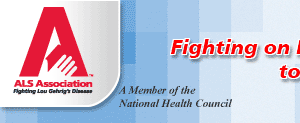

 |
 |
|
October 09, 2008 ALS Registry Act President Bush signed the ALS Registry Act into law on October 8, which marks a major milestone in the fight against Lou Gehrig’s Disease. The House of Representatives passed the ALS Registry Act (S. 1382) on September 26 following action by the U.S. Senate on September 23. The ALS Registry Act establishes the first ever national patient registry of people with Lou Gehrig’s Disease, or amyotrophic lateral sclerosis, to be administered by the Centers for Disease Control and Prevention. The registry will collect information leading to the cause, treatment and cure of the deadly neurological disease that took the life of baseball legend Lou Gehrig in 1941. “The ALS Association and people with ALS across the country have been working with Congress for nearly four years to pass this critical legislation,” said Gary Leo, president and CEO of The ALS Association. “It’s long overdue. Today, the U.S. Congress has made it clear that our nation is committed to finding a treatment and cure for this horrific disease.”
The ALS Registry Act enjoyed broad bipartisan support thanks to the grassroots efforts of thousands of people with ALS and their families who reached out to Congress as well as the efforts of Congressional leaders to shepherd the bill through the legislative process. “Today’s victory could not have been accomplished without the active involvement of people with ALS and their families,” said Steve Gibson, The Association’s vice president of Government Relations and Public Affairs. “And it could not have passed without the bipartisan leadership from Senate Majority Leader Harry Reid (D-NV), Senator John Warner (R-VA), Senator Lisa Murkowski (R-AK), Representative Eliot Engel (D-NY), and Representative Lee Terry (R-NE). The ALS community deeply appreciates their commitment to our cause and their tireless efforts which have directly led to today’s victory. ” Gibson also noted that the bill will benefit our nation’s military veterans. “Although ALS can strike anyone, regardless of their age, gender, race or nationality, recent studies have shown that the disease strikes military veterans at approximately double the rate as the general population. A national registry will enable us to learn why our veterans are at greater risk of ALS so that we can take action to help them and to protect the lives of our heroes serving in the military today. The ALS Association is now prepared to take the next steps in partnering with the government to build the registry.” The ALS Registry Act was introduced in the Senate by Reid and Warner and in the House of Representatives by Engel and Terry. As Congress sent the legislation to President Bush, members of Congress from both sides of the aisle acknowledged the more than three-year fight that led to today’s action and noted the important role a national ALS registry will play in the continuing fight for a treatment and cure. “After years of obstruction, both chambers of Congress approved our legislation that will give hope to those affected by ALS,” Reid said. “This bill will arm scientists with the tools they need to make progress in the search for a cure for ALS, or possibly a way to prevent this devastating disease in the first place. I am so pleased that we were finally able to pass this legislation on behalf of all of the individuals and families who have shown exceptional courage and grace in the face of this difficult illness.” “The great Lou Gehrig put a national face on ALS over 65 years ago, and my own family was devastated by the death of my grandmother, Dora Engel, who is believed to have passed away as a result of ALS in her 50s,” Engel said. “The establishment of a registry will bring new hope to thousands of patients and their families that ALS will no longer be a death sentence.” |
|
| |||
The ALS Association �2004 The ALS Association. All rights reserved. Contact the Webmaster |